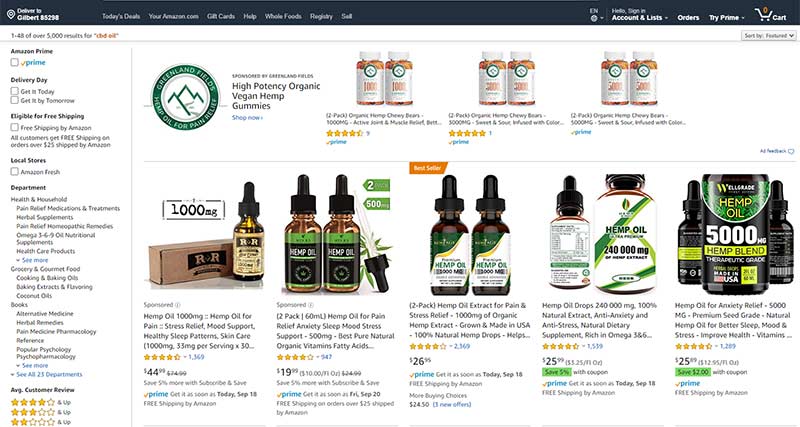 Shop
ShopBroad-Spectrum CBD Softgels
Broad-Spectrum CBD Oil Tincture
Full-Spectrum CBD Softgels
Full-Spectrum CBD Oil Tincture
CBD Gummies
CBD Balm
CBD Dog Treats
All Products >

If you live in the USA, there is a good chance that Amazon is part of your daily life. Business Insider reports that over 100 million people are Amazon Prime members. If you're like me, you've probably even run across someone who has purchased CBD oil from Amazon.
With a quick search, you'll find that there appears to be no shortage of CBD available on Amazon. Behind the scenes though, there is some deception going on that has tricked many would-be CBD customers.
In this article, we look at the situation in the marketplace and help you understand why Amazon is NOT the place to be shopping for CBD.
The first thing to know is that Amazon clearly outlines via their seller policies that the sale of CBD products is strictly prohibited. The following is outlined in their restricted products guidelines:

So if CBD sales are prohibited on Amazon, what the heck is going on here? The short answer is that all the products that appear here do not actually contain CBD, or they do but are labeled in such a way as to not violate Amazon's policies.
At the time of writing, a search for 'CBD oil' on Amazon returns thousands of results. Viewing the results, you're met with a wealth of products labeled as "Hemp Oil":

Understanding hemp oil terminology is the key to understanding what is going on here. The term 'hemp oil' is general and can be used to describe any oil derived from the hemp plant. There are two main subtypes of hemp oil and it all depends on which part of the plant was used to create the oil which we cover in our article on the topic.
The first type is hemp seed oil which is created by cold-pressing hemp seeds. This oil is rich in omega fatty acids but does not contain cannabinoids like CBD or terpenes. This oil does not face the same regulatory restrictions as CBD and has long been widely available for sale - hence it's appearance all over Amazon.
The second type is CBD oil which is created using the flowering tops of hemp plants. These extracts are created using Co2 or ethanol extraction. The resulting oil is rich in cannabinoids like CBD and a wide range of terpenes.
This is the key to understanding what is going on on Amazon. It's easy to see now that the products returned for this search are all hemp seed oil products - or at least products that appear to be hemp seed oil products. Products generally fall into two categories:
You'll find many products that confirm the situation we've described above by displaying hemp seed oil right on the ingredients list.
Others don't mention the source of the oil, but list omega fatty acids indicating the product is hemp seed oil and not CBD oil. These products also often show unusually high milligram listings. Generally, real CBD products range from 100-2500 milligrams of CBD in a given product. They also clearly outline that this measure is milligrams of CBD.
It's not uncommon to find hemp seed oil products on Amazon claiming thousands, tens of thousands, and even hundreds of thousands of milligrams of generically labeled 'hemp extract'.
To make up for Amazon's restrictions and further portray the image of a CBD product, many sellers make use of CBD industry terms. You'll find claims like Co2 extracted, ethanol extracted, flavonoids, terpenes, 3rd party tested, and claims of effects that mirror that of traditional CBD products. These terms are not restricted by amazon - but prove nothing about the CBD contents of a product - they are simply being used to try to influence would-be customers.


It's unfortunate that when advising potential CBD users "lookout for fakes" and "beware of marketplaces that sell misleading products" is even part of the conversation, but as of today, it is.
If you're after a quality CBD product, your best bet is to purchase directly from reputable companies. Additionally, you want to verify what is in the product(s) you purchase by looking at the lab reports.
Companies selling direct aren't restricted by marketplace policies and should freely provide accurate descriptions of the product contents and provide documentation to back up their claims. Please visit our CBD Buyers Guide which will help you screen trustworthy brands to ensure you're buying safe, clean, effective products.
No matter how you look at this question, the motivation behind what is going on here always points back to money. As CBD explodes into the mainstream, the amount of attention in the space is swelling. Amazon recognizes this and wants in on the profits - even if they can't actually sell what people are looking for.
Despite their clear policy against selling CBD on their marketplace, Amazon is happy to show what could be called "related" products for a CBD oil search. What this effectively does is captures the attention and directs customers into the eCommerce giant's selection of "CBD-looking" products - without any warning along the way.

Google trends graph showing CBD oil search popularity.
It seems that there is no legal issue showing alternatives that are indistinguishable from the real thing to the untrained eye in order to capture profits. The unfortunate truth is that this is simple deception at the cost of consumers.
Our suggestion to Amazon would be to return no search results for 'CBD oil' and related search terms. Additionally, messaging clearing up the deception on these search pages and product pages is needed to help educate shoppers. Unfortunately, this situation is unlikely to change, so instead, we've decided to spread the message about Amazon and CBD oil far and wide!
Don't hesitate to leave any questions or comments below, and be sure to share this article with your friends and family - especially those who are avid Amazon shoppers!